Botswana
Botswana, Tswana term meaning “country of Tswanas” of the name of the main ethnic group, in long form the republic of Botswana, in Tswana Lefatshe Botswana, is a country of southern Africa without access to the sea, surrounded by South Africa to the south and southeast, Namibia to the west, Zambia to the north and Zimbabwe to the northeast. The locals are called the Botswana people. In the past, the British protectorate was called Bechuanaland. Botswana adopted its name after independence from the Commonwealth on September 30, 1966. Its capital is Gaborone. Its economy, mainly linked to its South African neighbor, is dominated by services (43% share of GNP in 1999), mining (48%), industry (4%) and agriculture (5%). Its transparency rate was 6.1 in 2011 (5.4 in 2007) on a scale of 10, making Botswana the least corrupt country on the African continent. The country is regularly ranked first among African countries in terms of governance and transparency (30th out of 174 countries according to the 2012 Transparency International Corruption Perceptions Index). This country is nicknamed “the African miracle”, “the exception of the continent” or even “the Switzerland of Africa”.
Botswana’s history
At the end of the 19th century, hostilities broke out between the Tswanas, living in Botswana, and the Ndebele tribes migrating to this territory from the Kalahari Desert. Tensions are also escalating with Boer settlers from the Transvaal. After the requests for assistance launched by the Botswana leaders Khama III, Bathoen and Sebele, the British government puts Bechuanaland under its protection on March 31, 1885. The northern part of this territory comes under direct administration as a protectorate of Bechuanaland, forming current Botswana. The southern part of the territory is integrated into the Cape Colony, and is now part of the northwestern province of South Africa. The majority of people speaking Setswana now live in South Africa. When the Union of South Africa was formed in 1910, including the main British colonies in the region, the protectorate of Bechuanaland, Basutoland (now Lesotho) and Swaziland (now Eswatini) – the High Commission Territories – were not not included, but their subsequent incorporation is planned. However, the British Empire vaguely undertakes to consult the inhabitants of these territories beforehand. Although the successive governments of South Africa seek several times to integrate these territories, the United Kingdom continues to delay its decision, and this integration never happened. In 1948, the National Party was elected to government, and it instituted apartheid in South Africa. He withdrew from the Commonwealth community in 1961, thereby ending any prospect of integrating these territories into South Africa.
An expansion of British central authority and the evolution of tribal government led to the creation in 1920 of two advisory councils representing Africans and Europeans. The proclamations of 1934 regularize the laws and powers of the tribes. A Euro-African advisory council was formed in 1951, and the 1961 constitution created a legislative advisory council. In June 1964, the United Kingdom accepted the proposals for the creation of an autonomous democratically elected government in Botswana. In 1965, the seat of government was transferred from Mafikeng in South Africa to the newly created Gaborone. The 1965 constitution led to the first general elections and independence on September 30, 1966. Seretse Khama, a leader of the independence movement, was elected first president of the Republic of Botswana. Re-elected twice, he died in office in 1980. The presidency was transferred to the vice-president, Quett Masire, who was elected in his own name in 1984 and re-elected in 1989 and 1994. Masire retired from his post in 1998. The presidency is transferred to the vice-president, Festus Mogae, who then wins the 1999 election and is re-elected in 2004. The next president is Lieutenant-General Ian Khama, who takes office in 2008, in anticipation of the 2009 elections. is the son of the first president of Botswana, and a former head of the Botswana army (BDF). Formally elected in 2009 and re-elected in 2014, he remained in office until 2018, when he resigned to make way for Vice-President Mokgweetsi Masisi, who succeeded him.
Botswana’s politics
Botswana’s policy is carried out within the framework of a republic, combining a presidential regime with a representative democracy, in which the president of Botswana is both the head of state and the head of government. Executive power is exercised by the government. Legislative power is exercised by the government and parliament of Botswana, but the judiciary is independent of the executive and the legislature. It is also a multi-party system, dominated since independence by the Democratic Party of Botswana.
Botswana’s economy
Botswana could easily pass for a model of economic success on the African continent. It built its future on a democratic, stable, competent and little corrupt administration (Transparency International regularly classifies it as the least corrupt country in Africa), prudent management and a subsoil rich in diamonds (of which it is the third world producer) and minerals (copper, nickel), but also coal and oil. This country, which at the time of its independence in 1966 was one of the poorest twenty-five in the world, is now ranked among the most prosperous on the continent. It is the only country in the world which was able to post, during the period 1970-2000, an average annual growth of almost 9%; it is also the only country with Cape Verde in 2007, the Maldives in 2011 and Samoa in 2014 to have left the group of least developed countries in 1994. This theoretical wealth is however threatened by an excessive dependence of the economy on the mining sector, as well as by the AIDS epidemic which rages in all strata of the population (almost one in three adults would be infected). Since April 2012, the country has been on the French list of tax havens. The government of Mokgweetsi Masisi lifts in 2019 the ban on elephant hunting and offers in hunting auctions with companies hunting licenses. These companies then resell them, with a margin, to trophy hunters. Southern Africa has become the scene of hunting tourism, mainly from the United States.
Botswana’s demography
Botswana’s population is estimated at 2,209,208 inhabitants in 2016 by The World Factbook, and was 2,024,787 according to the 2011 census. 32.4% of the population was aged 0 to 14 years, 63 , 5% aged between 15 and 64 and 4.1% aged 65 or over. The country is experiencing population growth of 1.19% per year in 2016, with a birth rate of 20.7%, a mortality rate of 13.3%, an infant mortality rate of 8.6%, a fertility of 2.3 children per woman and a migration rate of 4.5%. With only 3.8 inhabitants / km2, Botswana is one of the least densely populated countries in the world. About 20% of the population is affected by HIV. Life expectancy in 2013 was 56.9 years for men and 54.3 years for women.
Botswana’s education
Modern education has long been provided by Catholic missionary orders alone. Botswana has made great strides in the development of education since independence in 1966. At that time, there were very few graduates in the country, and only a very small percentage of the population made it to the country. ‘secondary school. With the discovery of diamond veins and the increase in the government budget that followed, Botswana acquired the financial means to develop the field of education. All students are guaranteed ten years of basic education, leading to a junior qualification certificate. About half of the school population participates in two more years of secondary education leading to the award of the Botswana General Certificate of Education (BGCSE). After leaving school, students can enroll in one of the country’s six technical colleges, or take vocational training courses for teaching or to become a nurse, for example. The best students enter the University of Botswana in Gaborone, a modern and well-equipped university, with a student population of over ten thousand. Quantitative gains have not always been rewarded with qualitative gains. Primary schools in particular still lack resources, and teachers are paid less than their colleagues in secondary school. The Botswana government hopes that by investing a large share of national revenue in education, the country’s economy will become less dependent on diamond revenues, but also less dependent on expatriates to supply its labor market with skilled workers. In January 2006, Botswana announced the reintroduction of tuition fees after two decades of exclusively state-funded education. However, the government still plans to grant scholarships to any student at the University of Botswana or if training is not provided locally, such as medical studies, when they have to study abroad.
Botswana’s language
The official languages of Botswana are English and Tswana. Tswana is the common language. 45% of the population is fluent in English as a second language, and 2.8% of the population speaks English as a mother tongue (2011).
-
Botswana
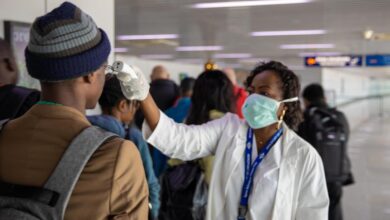
Botswana’s Health Ministry Detects Four People With New Omicron Sub-Variant
Botswana’s health ministry has discovered a new variant of Covid-19 that is believed to be a mutation of the Omicron…
Read More » -
Botswana
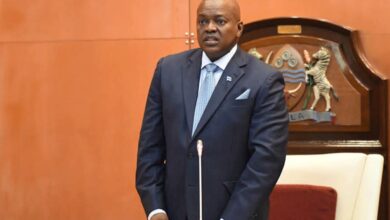
Botswana’s President Masisi Tests Positive For Covid-19, Goes in Self-Isolation
Botswana’s President Mokgweetsi Masisi has been placed in mandatory self-isolation after testing positive for COVID-19 in routine testing, a government…
Read More » -
Botswana
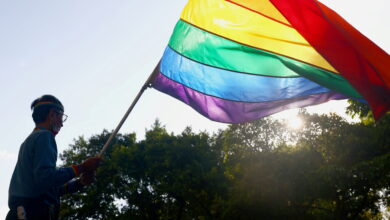
Botswana’s Court Upholds Ruling Decriminalising Same-Sex Relationships
Botswana’s government on Monday lost an appeal to overturn a landmark ruling that decriminalized homosexuality in the country, reported Africa…
Read More » -
Botswana

Botswana’s Health Minister Says 19 Cases Of Omicron Variant Detected In Country
Botswana’s Health Minister Edwin Dikoloti on Sunday said it had detected a total of 19 cases of the new Covid…
Read More » -
Botswana
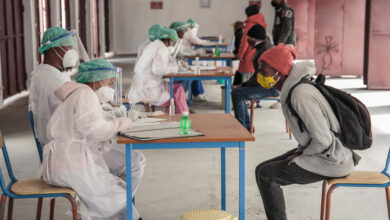
Botswana To Resume Mass Covid-19 Vaccination Campaign From Wednesday
The Botswana government on Tuesday announced the mass COVID-19 vaccination campaign in the country will resume from Wednesday, Aug. 18,…
Read More » -
Botswana
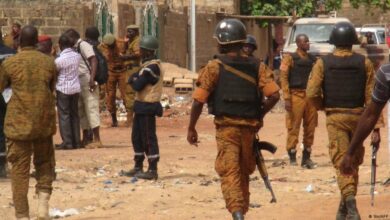
Botswana’s Government Deploys Troops To Mozambique To Fight Insurgency
Botswana’s government on Monday sent 296 troops to Mozambique to join soldiers from other Southern African Development Community, or SADC,…
Read More » -
Botswana

Botswana’s Health Ministry Counts On Other Vaccines As It Runs Sort Of AstraZeneca Shots
Botswana’s health ministry on Friday said about 15,000 people will not be able to get the second dose of AstraZeneca’s…
Read More » -
Botswana

Botswana: President Mokgweetsi Masisi Announces Phased Reopening Of Borders
Botswana’s President Mokgweetsi Masisi has announced the lifting of international travel restrictions in the country in a phased manner, starting…
Read More » -
Botswana
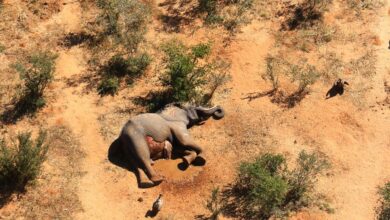
Botswana: Government Launches Probe Into Mysterious Deaths Of Elephants
The Botswana government has launched a probe after hundreds of elephant carcasses were found in the popular Okavango Delta area…
Read More » -
Botswana

Botswana: President Mokgweetsi Masisi Goes Into Coronavirus Quarantine
Botswana’s President Mokgweetsi Masisi on Thursday went into a 14-day self-isolation after an employee in the presidential office was confirmed…
Read More » -
Botswana

Botswana Reinstates Lokcdown In Gaborone Due To Surge In New Coronavirus Cases
The Botswana government on Friday reinstated lockdown in the capital city, Gaborone following an increase in the number of Covid-19…
Read More » -
Botswana

Botswana: Government Ends 48-Day Coronavirus Lockdown To Restart Economy
The Botswana government has decided to end a 48-day lockdown at midnight on Wednesday, reported Reuters. The lockdown was aimed…
Read More » -
Botswana

Botswana: President Mokgweetsi Masisi Fires Two Senior Health Officials
Botswana’s President Mokgweetsi Masisi on Wednesday dismissed the permanent secretary Solomon Sekwakya and deputy permanent secretary Morrison Sinvula with immediate…
Read More » -
Botswana
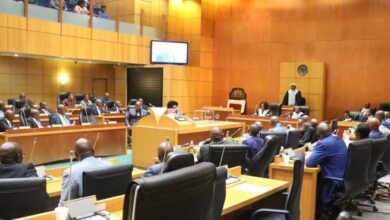
Botswana: All Cabinet Members Agree 10% Pay Cut To Support Coronavirus Relief Fund
The Botswana government on Tuesday announced all the cabinet members have agreed to donate 10% of their salaries towards the…
Read More » -
Botswana

Botswana: Entire Parliament Placed Under Quarantine After Coronavirus Scare
Botswana’s President Mokgweetsi Masisi along with all other members of parliament have been placed under a 14-day mandatory quarantine after…
Read More » -
Botswana
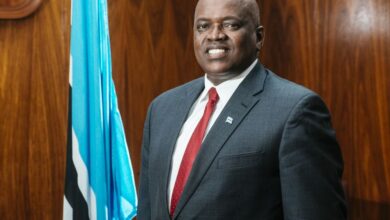
Botswana: President Masisi Tests Negative For Coronavirus, Released From Home Quarantine
Botswana President Mokgweetsi Masisi tested negative for coronavirus on Wednesday and has subsequently been released from home quarantine, reported Africa…
Read More » -
Botswana

Botswana President Mokgweetsi Masisi In Self-Quarantine After Namibia Visit
Botswana’s President Mokgweetsi Masisi has gone into self-quarantine for 14 days after returning from a trip to neighboring Namibia, the…
Read More »

